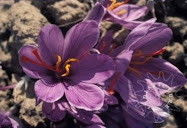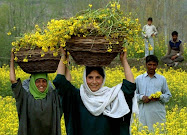 The early day today started with a memorable ritual. The Darshan of the filled in thali as noted in the earlier post (Buth-Wuchun) took me instantly back to our roots. We have experienced an unprecedented revolution in our lives during these years. Though on the face of it everything is normal, even better, as our children have grown financially stronger during these years, they are well off and the dimensions of our thoughts and deeds have widened substantially having come out of the solitude of the valley but still emotionally we are out of place especially we elders. Sometime I attribute it to our stubborn attitude of not accommodating with the changed circumstances.
The early day today started with a memorable ritual. The Darshan of the filled in thali as noted in the earlier post (Buth-Wuchun) took me instantly back to our roots. We have experienced an unprecedented revolution in our lives during these years. Though on the face of it everything is normal, even better, as our children have grown financially stronger during these years, they are well off and the dimensions of our thoughts and deeds have widened substantially having come out of the solitude of the valley but still emotionally we are out of place especially we elders. Sometime I attribute it to our stubborn attitude of not accommodating with the changed circumstances.This festival reverberates our past visits to Hari-Parbat hillock situated in the periphery of Srinagar, an ancient and the holiest of the holy shrine of Kashmir. It’s the abode of Jagatamba Sharika Bagwati also known as Maha-Tripursundari or Raja-Rajeshuri. The eighteen armed Goddess is considered the presiding deity of Srinagar city. The Goddess Sharika is represented by a self-made Srichakra also called Mahashriyantra, which consists of circular mystic impressions and triangular patterns with a dot (bindhu) at the Centre. The holy Srichakra is engraved on a vertical holy rock (Shila) located at the middle of western face of Hari Parbat. Shri-Yantra is the most auspicious, most powerful Yantra worshipped for attaining all worldly desires. The saints and spiritually elevated persons devote themselves to it and achieve liberation from the cares of the world. The shrine called ‘Chakrishwar’ can be approached by a flight of one hundred and eight chiseled stones. The number one hundred and eight has a mystical significance in Hindu mythology.
The devotees used to visit Hari-Parbat regularly and reach the Shrine of Chakrishwar in the wee hours of the morning. On the occasion of Navreh thousands of KPs used to pay obeisance at the shrine and wish for their prosperity. Ashaad Navami (Har Navum) is said to be the Birthday of Maa Sharika. On this day the devotees made a sacrificial offering of ‘Teher-charvan’ (rice cooked with turmeric powder and mixed with oil, salt and cooked liver of goat) to the Goddess. This ritual was locally called ‘Chout Kharun’.
The whole hill of Hari Parbat seems to be the multi-dimensional figure of geometrical figure of Goddess Sharika and at the corner of the hill is this magnificent and holy rock and those who have the eye to look at it can find different geometrical images in the shape of triangles, squares and pentagons. One gets lost while gazing at this energy centre as it emits different figures while concentrating on it.The whole of Hari-Parbat is the holy of the holiest shrines as it’s the abode of numerous gods and goddesses. Since each and every stone, pebble, mound and slope of the hillock is auspicious so there was a tradition of going around the hill (Parikrama) in the wee hours of the morning and in olden days hundreds of KPs used to observe the Parikrama regularly, some of them all their lives, before their daily routine started. Now after the KPs having moved out of Kashmir these auspicious places seem neglected including Hari-Parbat though many a casual visitor visit the shrine and are welcomed by the security forces posted there for security....... (to be continued)
.jpg)




Dear bahnu ji as we also fondly call you, I was very happy to read about maa sharika in detail. My mother used to always say as i would leave the home "SHARIKYA HAVALE".I now see what she really meant as the early images of kashmir are vivid. THANK YOU ONCE AGAIN for leading us to our roots time and again SUNDEEP DASS
ReplyDeleteIt no doubt must be so difficult not to be nostalgic about the festivities which used to accompany Navreh in Kashmir.It was great to hear about Maa Sharika and the relevance of Hari Parbat.A thought just crossed my mind that in a land where goddesses abound is there any kind of gender bias found or practised like many parts of India?
ReplyDeleteYou’ve got it correct, Shalini. Women in Kashmir are greatly respected not only by Pandits but by Muslims too. Till quite recently divorces were unheard of in Kashmir. No harassment of women in any public places, a helping hand was always ready for a woman in trouble without distinction of caste or creed. This healthy attitude towards women still prevails in Kashmir quite in contrast to the plains.
ReplyDeleteThat is great to hear.But I also believe that divorce is not about being disrespectful it is a large number of times about being incompatible and thus not wasting useful lives in strife together,thus respecting individuality.We Indians need to understand that it should never be viewed as a taboo although one should try and adjust as much as possible which most of the time is the case before calling it a day.
ReplyDeleteShalini, your comment on divorce is quite realistic but the couples should in the first instance honour the sacred bond of marriage before making this liberty a license to exploit.
ReplyDeleteWhere is the question of exploitation in the context of incompatibility?On the other hand a union which is sacred just for namesake under societal pressure or family pressures violates the basic rights of freedom of those two individuals.we cannot sacrifice individual lives in the name of honouring any tradition whatever it may be as I firmly believe any wrong decision needs to be amended so that it in turn does not function as a license of exploitation.Empathy is important in this debate.Although i am strongly against unions such as the Chand-Fiza case which was sheer mockery of this holy institution,law and religion per se.
ReplyDeleteHere also I suggest closing this discussion and concentrate on the real purpose of my blog i.e. highlighting the essential characteristics of Kashmir culture especially for the benefit of KP youth who’re distancing themselves from it day by day being away from their roots.
ReplyDeleteMr. Bhat would you please tell me when will NAVREH will be celeberated this year.
ReplyDeleteI shall be verythankfull to you.
Regards
Pankaj Kaul